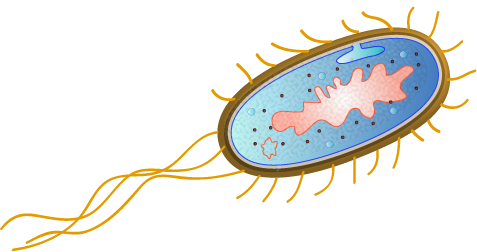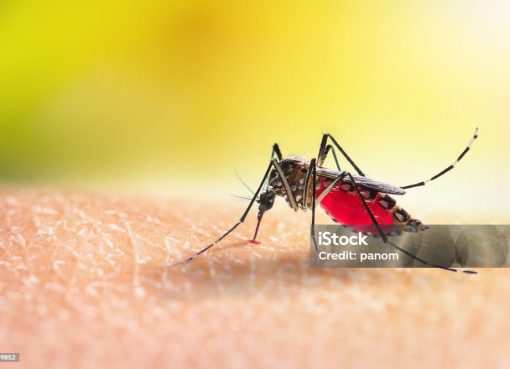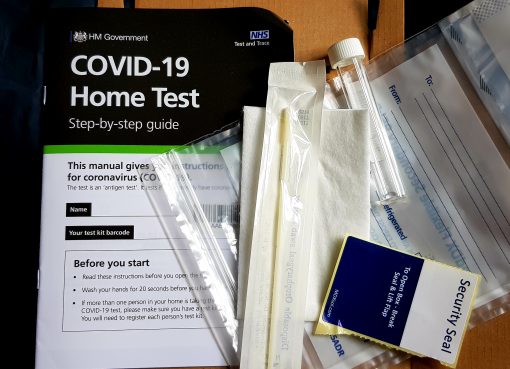Novel Escherichia coli to produce animal origin drug
Chondroitin sulfate (CS), a kind of sulphated glycosaminoglycans (GAGs), is a component of joint tissues in human. CS has therapeutic value and is commonly used in the treatment of osteoarthritis. Not only CS but also most of the commercial GAGs are extracted from animal tissues, particularly from cattle trachea and porcine intestinal mucosa. However, production of GAGs from animal tissues are prone to contamination and therefore alternative animal-free production method needs to be developed. Recently, scientists have designed a bacterium (Escherichia coli), and developed a simple and one-step biosynthesis method for CS production. The engineered E. Coli could produce almost ~27 μg of intracellular CS/g dry-cell-weight and about 96% of disaccharides produced were sulphated.
Source: Badri et al. (2021). Nature Communications 12, 389.https://doi.org/10.1038/s41467-021-21692-5
A hope for a HIV vaccine
Human immunodeficiency virus (HIV), a retrovirus is the causative agent of acquired immunodeficiency syndrome (AIDS). About 38.0 million people are infected with HIV across the globe (WHO, 2020). Today, it is one of the major public issues because there is no effective vaccine and no perfect cure available for this disease. Hence, the scientific community is in hunt for a cure and a potential vaccine against HIV. In this regard, International AIDS Vaccine Initiative (IAVI) and Scripps Research Institute have announced the completion of phase I clinical trial of a novel HIV vaccine. The vaccine could induce promising immune response among the participants.
A rapid paper-based sensor test to detect SARS-CoV-2 infection
COVID-19 caused by SARS-CoV-2 affected all corners of the globe and took many lives pre-maturely. The rapid spreading property of the SARS-CoV-2 pre-requisites rapid, accurate and cheap diagnostic test so that the quick transmission of this virus could be checked and prevented. Researchers across the globe have developed several rapid diagnostic assays but a research team led by Prof. Dipanjan Pan has recently produced a unique paper-based electrochemical sensor for accurately detecting SARS-CoV-2 infection within five minutes. The team has identified a novel molecule that could bind specifically to the viral genetic material. The novel molecules are combined with gold nanoparticles and embedded on a paper-based substrate containing graphene. Upon binding of SARS-CoV-2 genetic material to the molecules, there are changes in the sensor’s electrical response and that produces signals which indicate the presence of the virus. The test is very sensitive and specific, and it can detect up to 6 viral copies/µl of sample.
Source: https://www.news-medical.net/news/20210105/A-paper-based-sensor-for-detecting-COVID-19-quickly.aspx
Artificial positive control for COVID-19 testing
The most reliable test for detection of COVID-19 is Real-time PCR and it is considered as the gold standard for COVID-19 testing. However, in such type of laboratory tests, a positive control is a must and that means a diagnostic laboratory needs to maintain a positive control sample which is a risky matter. To avoid such a risk, nano-engineers at the University of California, San Diego have developed two coronavirus-like nanoparticles that could serve the purpose of positive control. One of the positive controls was made from a plant virus, viz. cowpea chlorotic mottle virus. This genetic material of nano-engineered plant virus is replaced with custom-designed RNA template specific to the SARS-CoV-2 genome but non-infectious in nature. The second positive control was prepared from bacteriophage nanoparticles. The designed bacteriophage consists of a SARS-CoV-2 non-infectious RNA sequence packed inside the bacteriophage shells. The main advantage of these artificial positive controls are that cold chain maintenance is not essential because the RNA fragments enclosed in these coronavirus-like nanoparticles are stable for a week at a temperature up to 40° C. The other merits of these positive control include: production process is easy and they do not pose a risk of infection to the laboratory handlers.
Source:
- Chan et al. (2021). Biomacromolecules, doi.org/10.1021/acs.biomac.0c01727.
- https://www.news-medical.net/news/20210302/Coronavirus-like-nanoparticles-could-serve-as-a-positive-control-for-COVID-19-tests.aspx
GalSafe: Genetically Engineered Pigs
Genetically engineered pigs have been approved by the US Food and Drug Administration (FDA) for human consumption and medical use. The engineered pigs are named as GalSafe because alpha-gal sugar was knocked out from the cell surface of these engineered pigs and as a result, the pork from such pigs does not produce allergic reactions in people with alpha-gal syndrome as well as the risk of organ rejection in xeno-transplanted patients is very low. Besides production of safe meat, these pigs can be used for production of drugs and to provide tissues or organs for human. GalSafe pigs were developed by a company called Revivicor.
Source: https://www.fda.gov/news-events/press-announcements/fda-approves-first-its-kind-intentional-genomic-alteration-line-domestic-pigs-both-human-food




